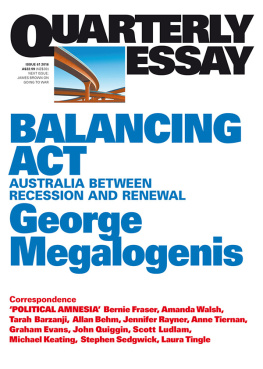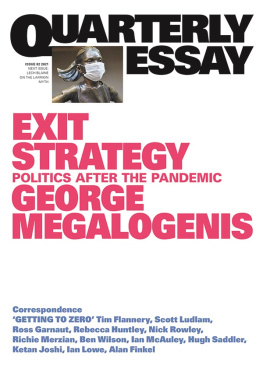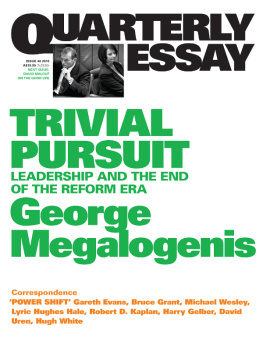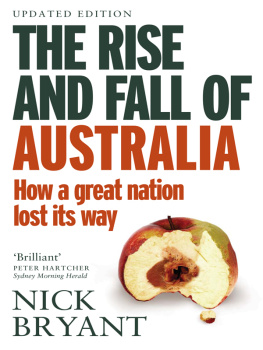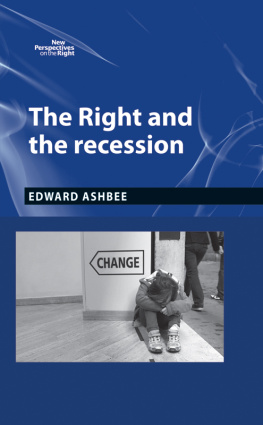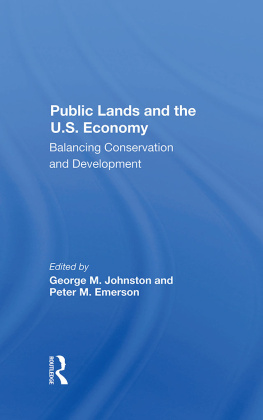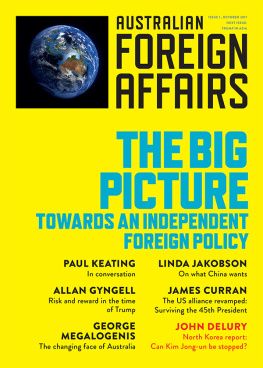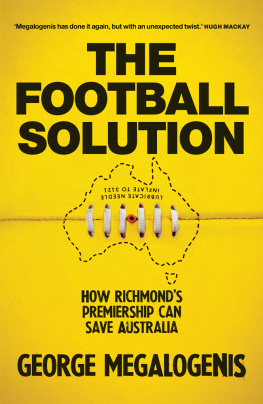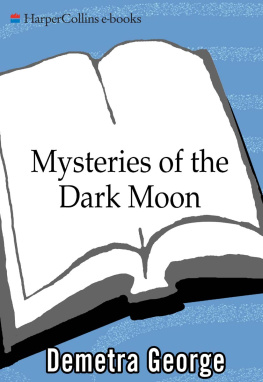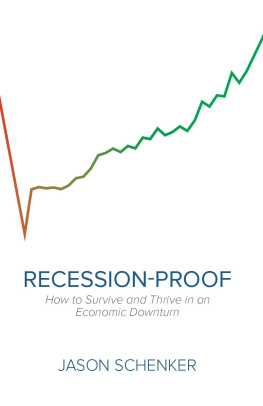Quarterly Essay is published four times a year by Black Inc., an imprint of Schwartz Publishing Pty Ltd. Publisher: Morry Schwartz.
ISBN 978-1-925203-83-7 ISSN 1832-0953
ALL RIGHTS RESERVED.
No part of this publication may be reproduced, stored in a retrieval system, or transmitted in any form by any means electronic, mechanical, photocopying, recording or otherwise without the prior consent of the publishers.
Essay & correspondence retained by the authors.
Subscriptions 1 year print & digital (4 issues): $79.95 within Australia incl. GST. Outside Australia $119.95. 2 years print & digital (8 issues): $129.95 within Australia incl. GST. 1 year digital only: $39.95.
Payment may be made by Mastercard or Visa, or by cheque made out to Schwartz Publishing. Payment includes postage and handling.
To subscribe, fill out and post the subscription card or form inside this issue, or subscribe online:
www.quarterlyessay.com
Phone: 61 3 9486 0288
Correspondence should be addressed to:
The Editor, Quarterly Essay
Level 1, 221 Drummond Street
Carlton VIC 3053 Australia
Phone: 61 3 9486 0288 / Fax: 61 3 9011 6106
Email:
Editor: Chris Feik. Management: Caitlin Yates.
Publicity: Anna Lensky. Design: Guy Mirabella. Assistant Editor: Kirstie Innes-Will. Production Coordinator: Sin Scott-Clash. Typesetting: Tristan Main.
BALANCING ACT | Australia Between Recession and Renewal |
George Megalogenis |
Australia is in transition. Saying it is easy. The panic kicks in when we are compelled to describe what the future might look like. There is no complacent middle to aim at. We will either catch the next wave of prosperity, or finally succumb to the Great Recession.
Each force that is pulling apart our present reads like a turgid unit in a university degree. The technological revolution. Population ageing. The Asian century. Global warming. The mining boom, and bust. The crisis in capitalism. What are the challenges and opportunities? Discuss.
Some of our leaders have revelled in the detail. Kevin Rudd wanted to be across every subject, although he couldnt stick to any one topic long enough for the public to catch up. The annoying imprecision of his method sent his successors to the other extreme of simplicity. It will be impossible for coming generations to separate the banalities of Julia Gillard from those of Tony Abbott. Moving forward and Stop the boats will be slogans shorn of their contexts, and our children will wonder if our prime ministers were really that shallow. No, they were the most talented politicians of their era, their old supporters will reply. It was just that governing was impossible in the digital age.
Malcolm Turnbull brings us back to where we started with Kevin07 this is a leader who sounds unafraid of the future. But we are no closer to understanding where the world is heading, or our place in it. We do know we want to remain affluent and egalitarian. Turnbull had that platitude worked out before he took over. He told us on the day he sought the Liberal leadership last September that he wants Australia to remain a high-wage, generous social-welfare net, first-world society. But in making that pledge, he acknowledged the root of our anxiety: the fear that we will be overrun by globalisation once China no longer has any need for our coal and iron ore.
The national mood has been defensive for so many years now that it is hard to recall the last time we were genuinely free of hang-ups and could look to the future with optimism. We greeted the new millennium as the cheery hosts of the Sydney Olympics, but virtually every message we have sent to the world since then has betrayed our parochialism. The Tampa episode of 2001 marked the birth of a long, complex phase of Australian insularity. Its first peak had nothing to do with asylum seekers. It came a few years after the Tampa, when the boats had stopped and the mining boom was underway. John Howard gave back every windfall dollar in the budget so that we could treat ourselves. That was the more revealing expression of our self-absorption, unprompted by a global crisis. We simply didnt care enough about the future to reinvest some of that money on behalf of our children. But then Howard double-crossed voters with his WorkChoices program, and the true source of our anger was confirmed it was globalisation itself. With WorkChoices, Howard reminded Australians that their government no longer felt obliged to defend them against the open economy. Rudds election win in 2007 briefly broke the spell. We applauded his handling of the global financial crisis, but once the danger had passed he lost his governing nerve, and a new cycle of narcissism commenced. The boats returned in 2009, reviving the old Australian dread of foreign invasion. Abbott ultimately turned the asylum seekers back again with the help of Labors more punitive policies, but still we were miserable, with him in particular and the world in general.
The supposed strengths of the Australian character our openness, our love of technology, our pluck have been notably absent in our attitude to the future. Put bluntly, we dont have a plan. We know we need one, written jointly across government, business, trade unions and civil society. But we keep finding excuses to return to the trenches of our prejudice. Even there, within the sanctuary of the tribe, there is little cohesion. The Liberal Party is split along fault-lines of ideology and personality. Labor still lacks purpose. The trade unions divide between the ineffective and the corrupt. Within my own profession, the media, too many commentators have assigned themselves to covering their rivals. News Corp, for instance, deploys more resources to attacking the ABC than analysing the economy. Only business appears to have unity of purpose in its relentless pursuit of concessions from government.
The most consistent message sent by voters to the main parties over the past decade and a half has been the demand for security. Both sides have taken this to mean border protection and bribes at the ballot box; one fist clenched against the rest of the world, while the other hand offers cash to the most aggrieved. Yet each leader that tried this was bewildered when voters could not be appeased. The truth is that the demand for security is more sophisticated than politics has allowed. We want our leaders to think for the long term; to prepare us for life beyond the mining boom. Both sides have found this in their research since the earliest days of the boom, but both have been unable to see past the next Newspoll. Something deeper is happening here than the predictable incompetence of politics. The system knows what voters are really asking for: a return to some form of government intervention in the economy. Yet this is resisted because of a misguided faith in the open economic model. The only leader who seriously tried to find a way out of the impasse was Rudd, but he lost focus after the global financial crisis. Now a Liberal prime minister is being asked by the public to redraw the line between the market and the state.
The economy was the primary reason Turnbull gave for challenging Abbott. It is clear enough that the government is not successful in providing the economic leadership that we need, he declared.
It is not the fault of individual ministers. Ultimately the prime minister has not been capable of providing the economic leadership our nation needs; he has not been capable of providing the economic confidence that business needs The big economic changes that were living through here and around the world offer enormous challenges and enormous opportunities and we need a different style of leadership. We need a style of leadership that explains the challenges and how to seize the opportunities. A style of leadership that respects the peoples intelligence We need advocacy, not slogans.

